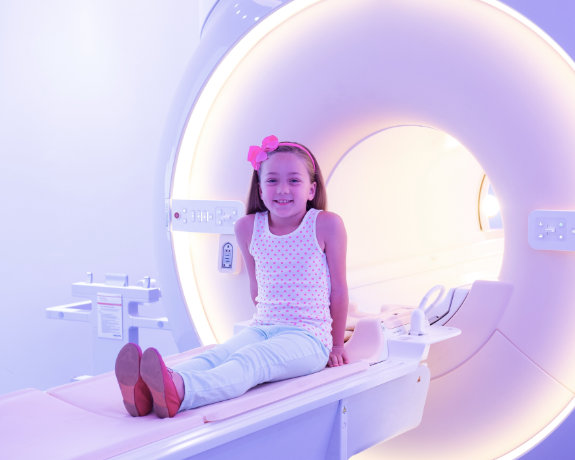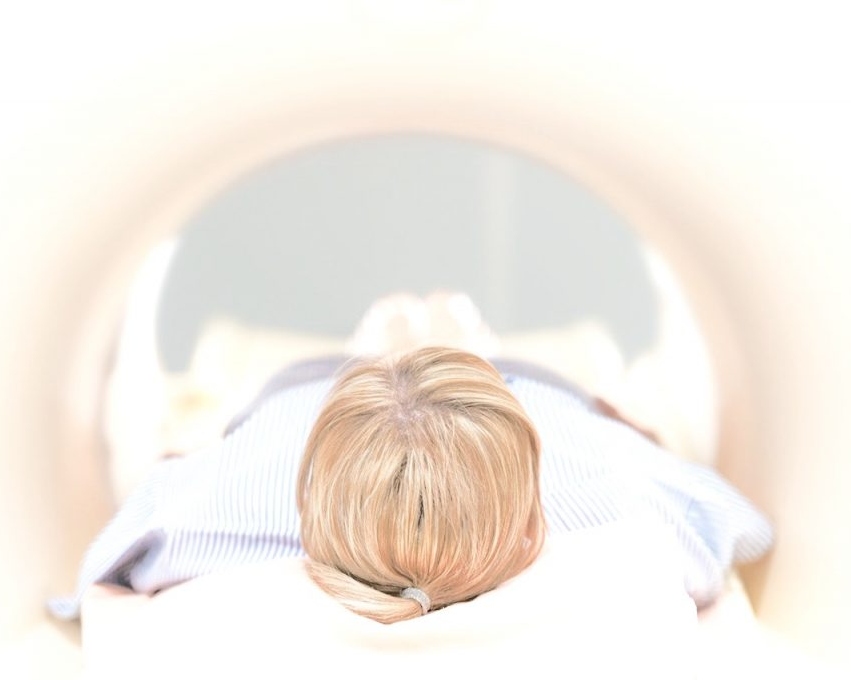This section of our website explains a little about having a magnetic resonance imaging (MRI) scan. It describes what is involved and the possible risks. It is not intended to replace an informed discussion with your doctor/clinician, but should act as a starting point to understanding your care pathway with InPhase.


Magnetic Resonance Imaging (MRI) is a method of producing high-resolution pictures of any part of the body. It can be used to diagnose a huge number of medical conditions including certain diseases that are not assessed adequately with other methods such as x-ray, ultrasound, or computed tomography (CT) scans.
MRI involves the use of a large scanning machine, which is an extremely strong magnet more than a metre in length. The body area to be scanned is positioned in the centre of the magnet. A Radiographer then uses radio waves and a computer console to generate a large series of detailed images, each one showing a thin slice of the area being examined.
Not really…the InPhase Radiographic team will perform your scan on a large mobile trailer unit (or Mobile MRI van). The MRI scanner within our trailer is very modern and is similar in appearance to that based within a hospital building. The main difference is that the InPhase scanner can be transported anywhere in the country to provide high quality scans for all patients.
Before your scan you may be asked to wait in our Mobile Waiting Room/Reception near to the scanner trailer. The InPhase mobile waiting room is a modern, climate controlled facility and has drinks provisions for your comfort.

A member of staff will position you within the scanner. You will be asked to keep very still while the scan is performed. We can use pillows and pads to aid your comfort before we get started.
The scanner is very noisy when it is in operation so it is necessary to provide you with ear protection/headphones. We can play music to you during the scan so please feel free to bring a favourite CD or Playlist to listen to.
The radiographic staff will be in a separate control room during the scan but you will be able to talk to them via an intercom system if required. If you feel uncomfortable or worried then please mention this to a member of staff who will help you feel at ease every step of the way.
Your scan MAY require an injection of contrast (a dye), which helps to produce more detailed images. The contrast medium will be injected via a cannula placed into a vein in your arm/hand before the scan. It is extremely rare for there to be any reactions to this procedure. If you are having a scan that requires contrast you may require a blood test prior to your appointment date to check your kidney function.
MRI is an extremely safe procedure and the scans do not involve the use of x-rays or radiation.
The scanner does, however, use a strong magnet so it is important that you tell us if you have certain implants in your body or if you have had certain operations (see Important Safety Information below).
Implants such as knee or hip replacements, dental work and gold/silver wedding rings are perfectly safe.
You should inform the radiographer if you have any small pieces of metal inside your body. In certain cases you may not be able to have the examination.

Because of the strong magnetic field some people are not safe to have an MRI scan. When you arrive, a friendly member of our team will complete a safety checklist with you to ensure that you are suitable for scanning.
Please contact your referrer (for example your GP, consultant or physiotherapist) if you have any of the following implants, as they will need to be checked thoroughly prior to your appointment. Your scan may not be possible for safety reasons if you have:
There is usually no need for any special preparation before your scan. On the day of your scan you will most likely be able to eat and drink as normal and take any medicines that you have been prescribed – if not we will inform you when you book your appointment or in your appointment letter.
You will need to remove all metal objects such as zips, jewellery, hair-grips (and so on) before entering the scan room because of the powerful magnet. Credit cards are also affected so please leave these and all other valuable items in the lockers provided.
Please do not wear heavy make-up/mascara if you are having a scan of your head or eyes as it may contain fine metallic particles which can affect the quality of the pictures.
We advise you to come in clothes which do not contain metal so that you don’t have to get changed on site and feel comfortable.
Examples of safe clothing:
Male patients – jogging pants (or trousers without zips),
shorts, t-shirt/shirt or vest
Female patients – elasticated skirt/tracksuit/trousers,
shorts, vest and a sports bra (no under wiring or fastening clips)
You will be asked to change into a hospital style gown or scrub wear
clothing if you attend wearing items that contain metal.
The duration of scans varies considerably depending on the part of the body being examined.
Most scans of a body area are completed in 20-35 minutes but we advise you to allow at least 1.5 hours for your appointment.
We do not always know exactly how long a particular scan will take. Occasionally an appointment time may be slightly extended. We would appreciate your understanding if this happens to you or to the friend/relative that you are accompanying.

There are currently no known dangers from MRI, although as a precaution we do not carry out scanning during early pregnancy (first trimester 1-12 weeks) unless the scan is essential. We would need written permission from your referrer (the person who has sent you for your MRI, for example, your GP, consultant or physiotherapist).
Don’t worry. We are here to help. If you have any fears or doubts, don’t hesitate to talk to one of our staff. If you would like to visit the department before your scan to have a look around, please contact us.
We can make arrangements to suit your individual needs. In exceptional circumstances we may allow family members into the MRI suite with you, or we may be able to position you in a ‘feet-first’ orientation so that your anxiety is markedly reduced.
Your referrer should receive your scan images and report within a week. You should make an appointment with your referrer to discuss the results. The Radiographer will not be able to give you your results on the day of your scan.
